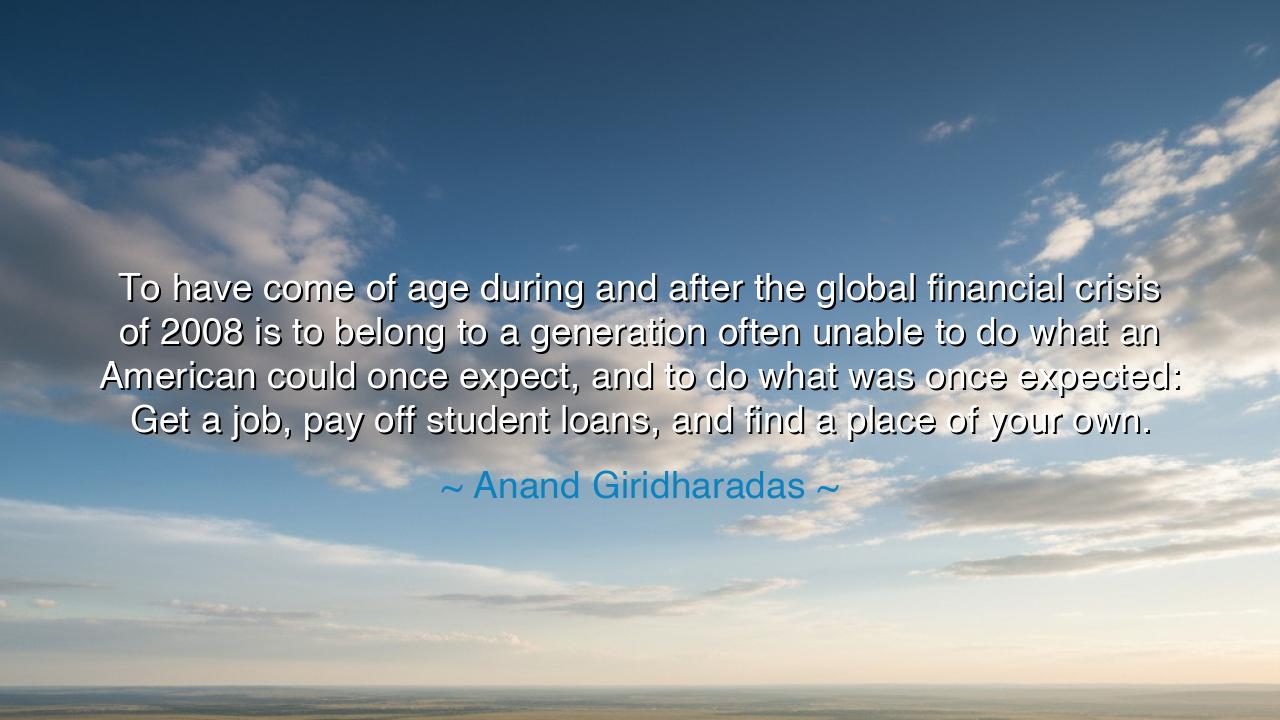
To have come of age during and after the global financial crisis
To have come of age during and after the global financial crisis of 2008 is to belong to a generation often unable to do what an American could once expect, and to do what was once expected: Get a job, pay off student loans, and find a place of your own.






In the aftermath of the great storms of the modern age, Anand Giridharadas spoke words that echo like a lament for a lost promise: “To have come of age during and after the global financial crisis of 2008 is to belong to a generation often unable to do what an American could once expect, and to do what was once expected: Get a job, pay off student loans, and find a place of your own.” These words are not merely an observation of economics, but a mirror held up to the soul of a generation. They speak of a wound both visible and unseen — a quiet disillusionment born not from failure of effort, but from the betrayal of systems that once claimed to reward it.
In times long past, to come of age was to inherit a world of possibility. In the golden age that followed the Second World War, the promise was simple: work hard, study, and the fruits of life would be yours. A home, a stable livelihood, the dignity of independence — these were not luxuries but expectations. But the financial crisis of 2008 shattered that inheritance. It was not merely a collapse of banks, but of faith — a faith that the world was fair, that virtue and diligence would be enough. The young who came of age in those years stood before the ruins of their parents’ promises, searching for meaning in a landscape transformed by debt, instability, and the cold logic of inequality.
Giridharadas speaks of a generation unable to do what was once expected, not because it has grown weak or apathetic, but because the ground beneath it has shifted. Where once stood steady paths, now lie shifting sands. Jobs became precarious, education became a burden of lifelong debt, and the home, once the symbol of adulthood, became a dream fenced off by rising costs. The rituals of success that once defined maturity — the career, the house, the family — have become mirages shimmering on the horizon of a generation that labors harder than ever, yet feels further from stability.
This story is not new in spirit. History has always tested its young with trials of transformation. Consider the youth of postwar Europe, who came of age amid rubble and hunger. They, too, had to rebuild what was lost, to forge meaning from ashes. Yet where they rebuilt cities, today’s young are called to rebuild trust — trust in institutions, in justice, in the very idea that effort leads somewhere. The challenge of our age is not the scarcity of material but the poverty of faith — faith in fairness, in future, in belonging.
But Giridharadas, in naming the pain, also reveals a path toward awakening. To recognize that one’s world is broken is not despair — it is the first act of moral clarity. It is to see, as the prophets of old once saw, that systems built on greed cannot sustain the human spirit. His words call for more than mourning; they summon the courage to imagine a new covenant between generations — one not built on empty promises, but on renewed solidarity, empathy, and truth. For if the old dream of success has failed, it is time to forge a new one, rooted not in ownership but in purpose, not in accumulation but in justice.
And so, O listener, take this as your inheritance: do not measure your worth by the yardsticks of a broken age. The world you have entered is uncertain, but within uncertainty lies the possibility of reinvention. Learn, as the wise have always done, to distinguish what is eternal from what is temporary. Wealth fades; character endures. The market rises and falls; integrity remains. You may not always be able to buy a house, but you can build a home in your courage, your compassion, your craft.
Thus, the teaching endures: every age must find its own definition of success. The young of today may not inherit the world their parents imagined, but they can create one their children deserve. When systems fail, let imagination rise; when hope dims, let solidarity be the new light. For though the promises of the old world may crumble, the human spirit — resilient, creative, and unbroken — will always find new ways to live, to love, and to build again.






AAdministratorAdministrator
Welcome, honored guests. Please leave a comment, we will respond soon